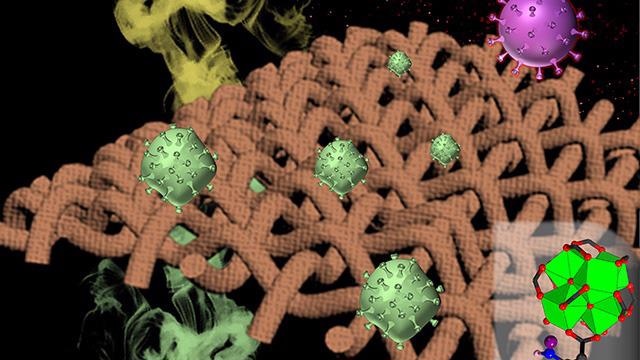A versatile composite fabric has been developed by a research group at Northwestern University. The fabric has the potential to deactivate both biological threats, like the novel coronavirus responsible for causing COVID-19 and chemical threats, like those utilized in chemical warfare.
 Programmable crystalline sponge-textile composite for the elimination of biological and chemical threats. Image Credit: Northwestern University.
Programmable crystalline sponge-textile composite for the elimination of biological and chemical threats. Image Credit: Northwestern University.
In general, it is rare to find a material that is effective against both classes of threats.
Moreover, the new material can be reused. It can be restored to its actual state once the fabric is exposed to threats with the help of a simple bleach treatment. Thus, the potential fabric can be utilized in face masks and other protective clothing.
Having a bifunctional material that has the ability to deactivate both chemical and biological toxic agents is crucial since the complexity to integrate multiple materials to do the job is high.
Omar Farha, Expert in Metal-Organic Frameworks, Northwestern University
MOFs are the basis for the new technology. Farha is a co-corresponding author of the study and a professor of chemistry in the Weinberg College of Arts and Sciences. He is also a member of Northwestern’s International Institute for Nanotechnology.
The fiber or MOF composite builds on a previous study in which Farha’s group developed a nanomaterial that deactivates harmful nerve agents. As there were few small manipulations, incorporating antibacterial and antiviral agents into the material was made possible by scientists.
According to Farha, MOFs are sophisticated bath sponges. Several holes are designed in the nano-sized materials to capture vapors, gases and other agents similar to how a sponge captures water.
In the newly developed composite fabric, the cavities of the MOFs consist of catalysts that have the potential to deactivate harmful bacteria, viruses and chemicals. The coating of porous nanomaterial can be easily done on textile fibers.
The study was reported recently in the Journal of the American Chemical Society (JACS).
The scientists discovered that the MOF or fiber composite showed quick activity against SARS-CoV-2 and both gram-positive bacteria (S. aureus) and gram-negative bacteria (E. coli).
Furthermore, the active chlorine-loaded MOF or fiber composite quickly degraded sulfur mustard gas and also its chemical simulant (2-chloroethyl ethyl sulfide, CEES). The MOF material’s nanopores coated on the textile are broad enough to enable water and sweat to escape.
Farha added that the composite material is scalable as it just needs fundamental textile processing equipment that is utilized by industry at present. On being incorporated into a facemask, the material must be able to function both ways. That is, safeguarding the mask wearer from the virus entry in his or her proximity as well as protecting people who come into contact with an infected person wearing the mask.
Additionally, the scientists were able to develop knowledge of the active sites of the material up to the atomic level. This enables them and others to infer structure-property relationships that could pave the way for the making of other MOF-based composites.
The study was financially supported by a National Science Foundation RAPID grant (2029270), the Army Research Office (W911NF2020136) and the Defense Threat Reduction Agency (HDTRA1-18-1-0003 and CB3934).
Journal Reference:
Cheung, Y. H., et al. (2021) Immobilized Regenerable Active Chlorine within a Zirconium-Based MOF Textile Composite to Eliminate Biological and Chemical Threats. Journal of the American Chemical Society. doi.org/10.1021/jacs.1c08576.
Source: https://www.northwestern.edu/